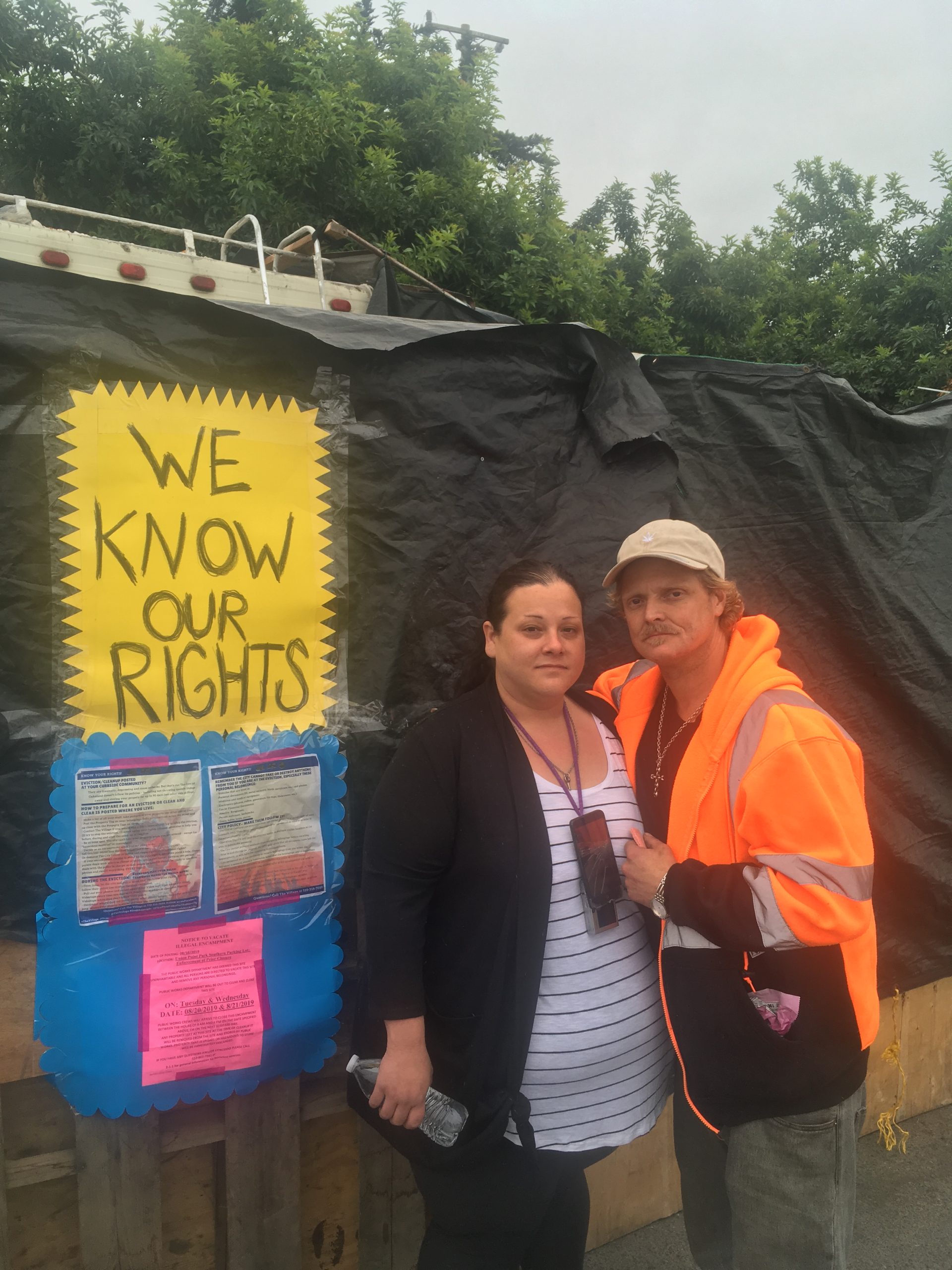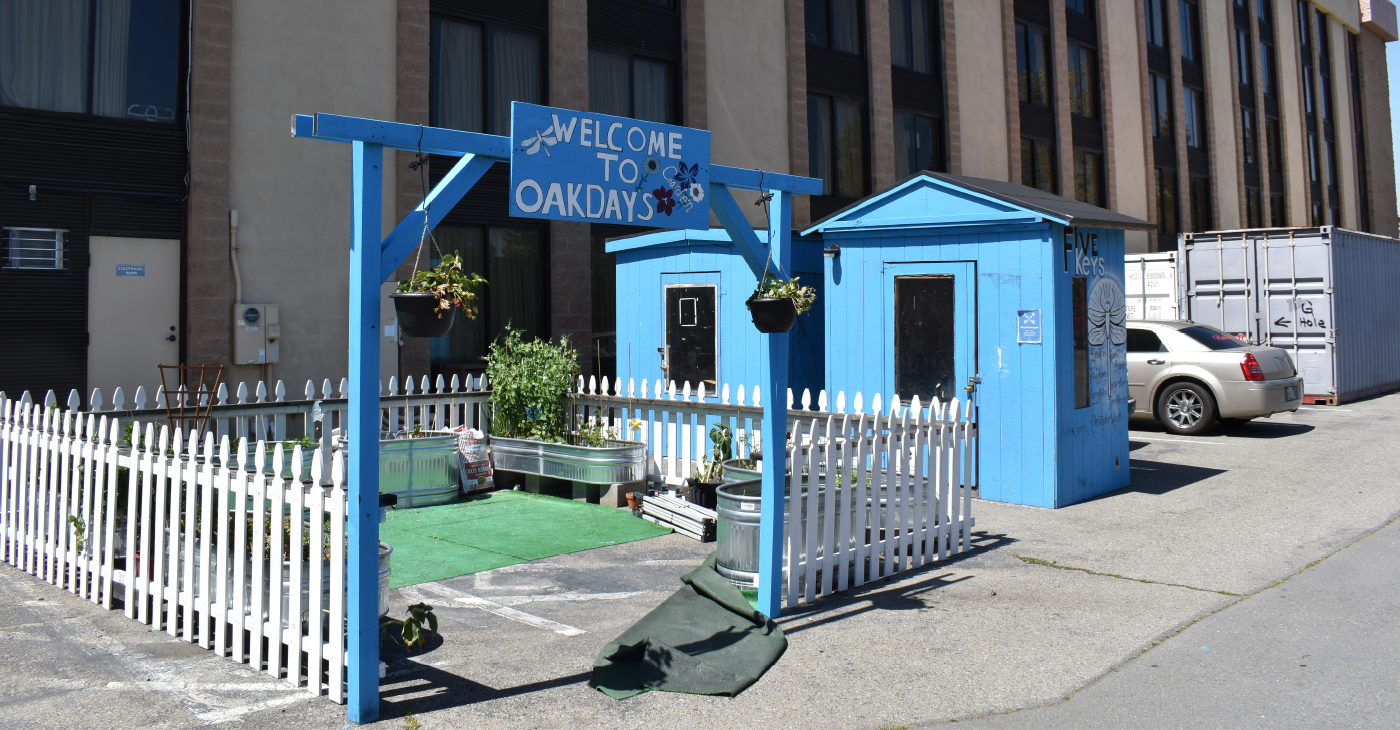Homeless
Oakland Evicts Residents of Union Point Homeless Camp

Oakland’s Department of Public Works (ODPW) and Oakland’s Police Department (OPD) and Auto Plus Towing evicted at least 20 adults and five children who were living in RVs, campers, and other vehicles in a parking lot in Union Point Park on Tuesday.
“I grew up within a mile radius of here my whole life and I’m a member of this community but they’re trying to shuffle me out of where I’m from,” said Nicole Kahele. “We’re staying in a public park because there’s no affordable housing.”
Kahele is one of four Union Point community members who, after experiencing past evictions, filed a lawsuit claiming the City of Oakland and Mayor Libby Schaaf are violating their fourth, eighth, and 14th amendment rights and that ODPW is not following its own stated policy when it evicts unhoused residents.
“The City is supposed to bag, identify and tag all the property that people want to keep but can’t take with them and store it for free for three months,” said Needa Bee, an unhoused, lifelong Oakland resident who lives outside of Union Point but is helping with the suit. “That has never happened in the three years that I have been following evictions.”
Kahele and the other defendants, all of whom lived at Union Point before the eviction, had filed a restraining order to U.S. District Judge Charles Breyer through their lawyer, Emily Rose Johns, that prevented ODPW from evicting them.
The order also protected other Union Point residents, as the city couldn’t evict some residents while allowing others to stay. But the city successfully challenged and overturned the order while Johns was on vacation and posted eviction notices on Friday, Aug 16, leaving most Union Park residents five days to pack all of their belongings to leave.
The rush to pack was especially difficult for those who have physical limitations and/ or disabilities. Elijah Marra, who was recovering from hernia surgery that he’d had two days before, complained of sharp abdominal pains as he packed his belongings. While he was able to keep his most important belongings, there was much he had to throw away.
Residents whose vehicles didn’t run, like lifelong Oakland resident Dre Nash, had to have them towed and impounded. The City offered some of these residents a single night in a homeless shelter but no one was offered permanent housing. Nash’s RV home and almost all of his belongings are currently in an impound lot and he’s unsure of when or how he can get them back.
Oakland’s assistant city administrator Joe DeVries, who helps to organize and implement the Schaaf’s administrations plans and policies for homelessness, claims that he and the city see eviction as a last resort, but that they’ve received complaints from housed residents, as well as the Bay Conservation and Development Commission and the California Coastal Commission.
“It’s tidewater land and it’s protected so it’s really not an appropriate place to have people camping,” said DeVries.
While DeVries claims the encampment was filled with trash and not well kept, those staying at Union Point claim it’s difficult to keep clean when the city doesn’t provide consistent trash service, and that housed residents would have the same issues if they didn’t have weekly trash pickup.
None of the Union Point residents the Oakland Post spoke with wanted to leave the site without being offered another permanent living option and many claimed they felt safe there as they supported each other.
While Union Point’s residents claim that some housed people come by and harass them, some nearby housed residents say they don’t want them forced out.
“They’ve fallen on hard times and everything’s so damn expensive here,” said Douglas Thorn, who’s lived near Union Point for three years. “I think they’re decent people, and I enjoy having them here.”
Bay Area
Mayor London Breed: State Awards San Francisco Over $37M for Affordable Housing
On April 30, Mayor London N. Breed announced San Francisco has been awarded more than $37.9 million in funding from the California Department of Housing and Community Development (HCD) as part of the State’s Multifamily Housing Program (MHP). The HCD loan will provide the final funding necessary for development of Casa Adelante – 1515 South Van Ness, a 168-unit affordable housing project located in San Francisco’s Mission District.

By Oakland Post Staff
On April 30, Mayor London N. Breed announced San Francisco has been awarded more than $37.9 million in funding from the California Department of Housing and Community Development (HCD) as part of the State’s Multifamily Housing Program (MHP).
The HCD loan will provide the final funding necessary for development of Casa Adelante – 1515 South Van Ness, a 168-unit affordable housing project located in San Francisco’s Mission District.
The new development at 1515 South Van Ness Ave. will provide 168 affordable homes to low-income families, formerly homeless families, and persons living with HIV earning between 25-80% of the San Francisco Area Median Income (AMI).
In addition, the project is anticipated to provide family-friendly amenities and ground floor community-serving commercial spaces that preserve the prevailing neighborhood character of the Calle 24 Latino Cultural District.
“This funding unlocks our ability to move on building affordable housing units for families in San Francisco at a crucial time. We understand the level of need for more housing that is accessible, and like the state, the city continues to face a challenging budget cycle,” said Breed. “1515 South Van Ness is a good example of what can be achieved in San Francisco when you have strong community partnerships and an unwavering commitment to deliver on critical needs for our residents.”
“From the beginning of my term as Supervisor, I have fought to bring affordable housing to 1515 South Van Ness” said Supervisor Hillary Ronen. “In the interim, the site has been utilized for homeless services and shelter, and I am thrilled that HCD has recognized the value of this development, and we are finally ready to break ground and bring 168 affordable homes to low income and formerly homeless families in the Mission.”
Owned and occupied by McMillan Electric Company until 2015, the City and County of San Francisco purchased 1515 South Van Ness Avenue in June 2019 with the intent of developing new affordable housing.
In November 2020, the San Francisco Mayor’s Office of Housing and Community Development (MOHCD) released a Multi-site Request for Qualifications (RFQ) seeking qualified developers to build affordable housing on the site, and subsequently selected Chinatown Community Development Corporation (CCDC) and Mission Economic Development Agency (MEDA) in May 2021 to develop the site.
The project is expected to begin construction in winter 2025.
“A strong, long-term push by Mission advocates to make this site 100% affordable is now paying off, with 168 family units that include services and childcare. People of color communities know what they need, and we are excited to be in partnership with a team, consisting of MEDA, CCDC, and MOHCD, that listens,” said Malcolm Yeung, Executive Director at CCDC.
“We are excited to be in partnership with CCDC, yet again, and for the opportunity to develop intergenerational affordable housing in the City’s Mission District,” said Luis Granados, executive director at MEDA.
Increasing housing affordable to lower-income and vulnerable residents is a key priority in the City’s Housing Element which calls for additional funding for affordable housing production and preservation, as well as Mayor Breed’s Housing for All Executive Directive that sets out the steps the City will take to meet the bold goal of allowing for 82,000 new homes to be built over the next eight years.
Tuesday’s funding announcement emphasizes the importance of regional and state collaboration in order to reach our housing and climate goals.
“We are thrilled—not just to bring a project of this size to a community with great need — but to do so with community-based developers and their partners who understand the neighborhood and sensitivities around cultural preservation,” said HCD Director Gustavo Velasquez.
Alameda County
An Oakland Homeless Shelter Is Showing How a Housing and Healthcare First Approach Can Work: Part 1
Hundreds of tents and abandoned vehicles now dot major streets and neighborhoods of the Bay Area. Unfortunately, this problem is expected to worsen as the housing market skyrockets and the cost of living becomes unattainable for most Americans.

By Magaly Muñoz
Hundreds of tents and abandoned vehicles now dot major streets and neighborhoods of the Bay Area. Unfortunately, this problem is expected to worsen as the housing market skyrockets and the cost of living becomes unattainable for most Americans.
As one of California’s biggest public policy challenges, over the past four years, the state has allocated nearly $20 billion to housing and homelessness initiatives. Despite this substantial investment, the issue does not seem to be easing. Instead, the number of people without stable housing is surging.
A 2022 Point In Time (PIT) Count showed that there were 9,747 homeless individuals living on the streets in Alameda County, an almost 22% increase from the 2019 count of 8,022 homeless individuals. Many reports estimate that this number will rise once the 2024 data is released.
Amongst the many initiatives to end homelessness, the 2016 Senate Bill 1380 established California as a “housing first” state that would provide assistance, programs and funding to those experiencing homelessness. The bill recognized that the evidence-based model of prioritizing housing could end all types of homelessness and is the most effective approach to ending chronic homelessness.
In the years following the passage of the law, doctors, county officials and a community organization came together to create a first of its kind shelter to combat homelessness with housing and healthcare: the Oak Days shelter. Located in the Hegenberger corridor of Oakland, this facility, once a Days Hotel, now houses 60 individuals, some who are medically fragile.
As local counties navigated how to isolate people during the start of the COVID-19 pandemic in 2020, the state obtained federal funding to begin Project Roomkey, an initiative providing non-congregate shelter options, such as hotels and motels for people experiencing homelessness, to protect life and minimize strain on the healthcare system.
Dr. Alexis Chettiar, a medical director in Alameda County, witnessed firsthand how the coronavirus disease took over the lives of the most vulnerable populations who were too sick to remain stable unless they had hands-on supportive health care and permanent housing.
She also noticed a trend of medically vulnerable individuals with psychiatric illnesses or substance abuse issues being expelled from nursing homes, often ending up in encampments or unsheltered conditions.
This observation would inspire her, along with fellow medical director Catherine Hayes, to start Cardea Health, supported by county funding.
“What we really wanted to do was to be able to layer on the medical services to a permanent supportive housing environment so that people could age in place, they could stay there, no matter how their care needs change over time. They could stay there through the end of their life,” Chettiar said.
Cardea Health provides medical and personal care for almost 60 patients across two sites. One of these sites is an Old Comfort Inn that was also transformed into a shelter for those experiencing homelessness and chronic illnesses. The medical team assists with tasks such as injecting insulin, administering dialysis, helping patients use the restroom or get dressed.
Chettiar shared that she’s seen people as young as 40 years old with health-related issues mimicking that of an 80-year-old. Some individuals had untreated wounds that led to infections or chronic illnesses that went untreated for years, leading to immense suffering before they were able to receive medical attention.
The harsh conditions of living on the streets have exacerbated what could’ve been manageable situations, into a full-blown health crisis that ultimately put them on the priority list for Cardea’s health assistance.
UCSF Benioff Homelessness and Housing Initiative conducted a survey of 3,200 people to study who is experiencing homelessness, how they became homeless, what their experiences are and what is preventing them from exiting homelessness.
Data from those surveys showed that 45% of those experiencing homelessness reported poor or fair health and 60% reported having a chronic illness. Participants also reported that being homeless worsened their physical and mental health.
Of those experiencing health problems, 23% couldn’t access necessary healthcare in the prior six months. Additionally, 38% visited emergency departments without hospitalization and 21% reported a hospitalization for a physical health concern.
Chettiar stated that the work at Cardea is intended to reduce hospital visits for those living on the streets, providing essential care where it’s needed most.
California Black Media
Audit: California Is Poorly Monitoring Homelessness Spending
California has failed to monitor state spending and evaluate the outcomes of homelessness programs, according to a report issued last week by the California State Auditor’s Office. California State Auditor Grant Parks urged Governor Gavin Newsom to continue to hold local governments accountable in an open letter dated April 9. The audit highlighted that tracking programs and collecting accurate data could help the state save money.

By California Black Media
California has failed to monitor state spending and evaluate the outcomes of homelessness programs, according to a report issued last week by the California State Auditor’s Office.
California State Auditor Grant Parks urged Governor Gavin Newsom to continue to hold local governments accountable in an open letter dated April 9. The audit highlighted that tracking programs and collecting accurate data could help the state save money.
“The state must do more to assess the cost-effectiveness of its homelessness programs,” Parks said.
The report showed that California spent approximately $20 billion on programs and initiatives addressing homelessness in the past five years. Although state funds were allocated to fund shelters and subsidized rent, homelessness in the state increased by 65 during the last year.
In 2021, Gov. Newsom signed a law that required organizations that received state funds to collect data and evaluate the progress of programs they implement.
California auditors revealed that only two out of five action plans were cost-effective. One was Project Homekey, which converted hotels into housing during COVID-19, and CalWORKS, a housing support that offered financial assistance to low-income residents.
Lawmakers on both sides of the aisle expressed concern after the report was released.
“The biggest conclusion that the auditors came back with is there’s just inadequate transparency and data and information available,” said Sen. Dave Cortese (D-San Jose) in a statement.
Republican Sen. Roger Niello (R-Roseville) said, “These audit results are a wake-up call for a shift towards solutions that prioritize self-sufficiency and cost-effectiveness.”
-

 Community3 weeks ago
Community3 weeks agoFinancial Assistance Bill for Descendants of Enslaved Persons to Help Them Purchase, Own, or Maintain a Home
-

 Activism4 weeks ago
Activism4 weeks agoOakland Post: Week of April 3 – 6, 2024
-

 Business3 weeks ago
Business3 weeks agoV.P. Kamala Harris: Americans With Criminal Records Will Soon Be Eligible for SBA Loans
-

 Activism3 weeks ago
Activism3 weeks agoOakland Post: Week of April 10 – 16, 2024
-

 Community3 weeks ago
Community3 weeks agoAG Bonta Says Oakland School Leaders Should Comply with State Laws to Avoid ‘Disparate Harm’ When Closing or Merging Schools
-

 Community2 weeks ago
Community2 weeks agoOakland WNBA Player to be Inducted Into Hall of Fame
-

 Community2 weeks ago
Community2 weeks agoRichmond Nonprofit Helps Ex-Felons Get Back on Their Feet
-

 Community2 weeks ago
Community2 weeks agoRPAL to Rename Technology Center for Retired Police Captain Arthur Lee Johnson












































